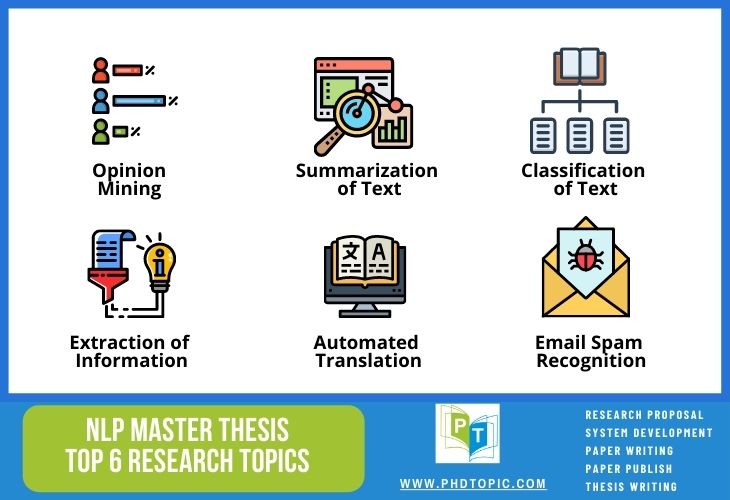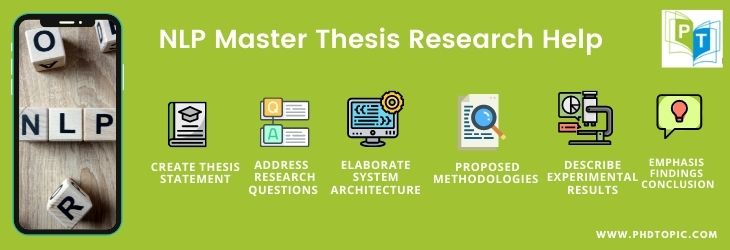The term NLP stands for Natural Language Processing. It is a kind of artificial intelligence technique used in human language understanding and analysis. Intellectual devices such as computers, smartphones, and some other gadgets are performing with natural language inputs. In fact, they are familiar with the binary or ASCII values. Thus handling & understanding the language inputs and producing the corresponding outputs are the main objectives in implementing NLP Master Thesis here.
An NLP process ensures multi-lingual based communication between humans and intelligent devices. Semantic analysis is one of the important approaches which have reserved a significant place in the recent growths of NLP technology. At the end of this article, you will be able to write your own NLP master Thesis without any hesitations. Now let us initiate the article with the overview and how NLP allows the smart devices to perform.

Overview of Natural Language Processing
- Language is being identified by exploring the text information & its insights
- Algorithms are the pillars of the NLP virtualized processes
The intellectual computer systems are facilitated by the NLP skills such as mentioned below.
- Understands the unstructured text groups
- Mining meaning inputs from text groups
- Computes the responses of the process
- Executes entire tasks
To conclude the overview of NLP, it is useful in the following tasks,
- Insights and inspects the content (what is the core meaning of the content?)
- Exploration and perspectives of the content (how, when, or why it’s?)
- Recognizing the emotions contented in the message (what are the sentiments/emotions/feelings?)
The above listed are the skillsets that can be obtained by the computer devices when it is accompanied with the NLP techniques. Apart from this, intellectual machines are being highly benefited by the NLP in various ways. If you do want further facts in this area you can approach our experts at any time. As the matter of fact, our technical team is offering technical assistance 24/7; we are being trusted by various students and scholars.
NLP consists of 2 important components. One is NLG and another one is NLU. In other words, these are basic elements of the NLP. Let’s have further explanations in the immediate passage with bolt and nut points.
Are you looking for an article in accordance with the NLP master thesis? Then this article is absolutely meant for you!!!
Components of NLP
- NLG – Natural Language Generation
- Sentence & Text Planning
- Text Recognition
- NLU – Natural Language Understanding
- Referential & Lexical Ambiguity
- Syntactical Ambiguity
Now we can see about the five categories of the NLP systems.
What are the Five Categories of Natural Language Processing (NLP) Systems?
- Pragmatic (Logical) Analysis
- Discourse (Integration) Analysis
- Semantic (Contextual) Analysis
- Parsing (Enriching)Analysis
- Structure (Lexicon) Analysis
The above listed are the 5 important categories of natural language processing and the possible application areas. We hope that you would understand the statements as of now listed. Some of the NLP applications phases are mentioned below for your better understanding.
- Chabot
- Automated Translation
- Speech Recognition
- Optical Character Recognition
The aforesaid are the applications get encompassed in the NLP so far. These applications play a vital role in natural language processing. In fact, it involves several processing steps. Our experts have listed you the same for the ease of your understanding. Let us try to understand them.
Processing Steps for NLP
- Load Dataset
- Textual or Numerical Elements
- Data Preprocessing
- Normalization
- Text Embedding
- Modeling
- Use any models for predictions
- E.g. Feed Forward Neural Network
- E.g. XGBoost
- E.g. Support Vector Machine
- E.g. Logistic Regression
- Use any models for predictions
- Outputs
- Performance Analysis Evaluations
As of now, we have discussed the fundamental steps of natural language processing. We have concentrated on the various aspects handled in the NLP to make you much wiser. As a matter of fact, our articles are being published in the top journals by having the best features in them.
When researching the NLP, we might face some of the important issues. You may not aware of this. We know the research issues and their corresponding solutions by frequently conducting experiments. In this regard, we wanted to list out several issues for the ease of your understanding.
What are the Important Issues in NLP?
- Ambiguity in ‘Semantics’
- Word phrase modifications (prepositions- on, with, by)
- Ambiguity in ‘Lexical’
- Different word usages (adverb, noun & verb)
- Ambiguity in ‘Syntactic’
- Vagueness in the sentences (verb & noun)
Semantic and syntactic ambiguities are being interconnected in nature. For your better understanding, let’s consider an example.
Ex: I saw a girl on the road with my sunglasses.
This can be neither understood as the girl is having my sunglasses with her nor it can be understood as I have seen the girl through my sunglasses. Hence it creates ambiguity syntactically. We hope that you are getting the points as of now stated.
We’ve also listed some of the other issues for your added knowledge as stated below,
- False-positive Handling
- Continuous Conversations
- Texts with Different Meaning
- Less Memory & Context Understanding
Till now, we have debated on the essential areas covered in the NLP. While doing projects and researches one should consider the algorithms used in that technology. Here, you might get confused with the algorithms lists that get involved in the NLP. Don’t worry guys we are going to cover the upcoming sections with the algorithms. Before jumping into that area, let us first discuss the outline of the NLP and how do they work. Shall we get into the next phase? Come let’s try to understand them.
Outline of NLP Algorithms
- Transfiguration of Strings to Vectors
- Phrase-Context Saving & Corpus Training
- Application of Probabilistic Methods
This is the shortest overview of the NLP algorithms. We know that you are getting curious about the algorithms. Hence we covered the next section with the algorithms and the workflow of the same for your better understanding.
How do NLP Algorithms Work?
- Training Data Outline
- Acquisition of Training Data
- Supervised Learning
- Unsupervised Learning
- Structure Forming
- Acquisition of Test Data
- Data Authentication
- Accuracy Evaluation
The listed above are the ways in which NLP algorithms do their work. Structures of the languages are being predicted by the discrete optimization methods and techniques to exactly recognize the structure of languages as given as input. NLP is highly compatible with machine learning concepts hence they learn plenty of rules by examining various test datasets. For example, books which are consisted of huge pages and various phases of sentences. The interpretation of the statistical elements is considered in the NLP. For your better understanding here we have pointed out the NLP machine learning algorithms for the ease of your understanding.
- K-Means
- Extraction of unstructured text similarities
- K- Nearest Neighbor
- Neighbor voting based data classification
- Naïve Bayes
- Probability based data point classification
- Naïve Bayes- Multi Class
- Probability-based data point classification assigning
- SVM – Multi Class
- Identification of classification dividers
The aforementioned are the various algorithms used in the NLP. In fact, our technical crew is very familiar with these areas. As they are filtered out from the talent, handling the complexities that arise is becoming easier for them. It results in the effective guidance of the students. In fact, we are offering many successful projects and thesis writing across the world. So if you want assistance in the NLP master thesis you can approach our expert without any hesitations. In this regard, let us discuss the research areas of the NLP.
What are the Research Areas of NLP Master Thesis?
- Opinion Mining & Emotion Analysis
- Summarization of Text
- Classification of Text
- Extraction of Information
- Automated Translation
- Email Spam Recognition
The itemized above are some of the research areas in NLP. Besides there are various research areas are presented with future directions. NLP is one of the promising technologies which can yield the best results among other projects. Yes, we are going to list you the future directions of the NLP for your better understanding of the concept.
What are the Future Directions of NLP?
- Multi-modal Learning Techniques
- NLP Resource-free Tasks
- Common Sense & Knowledge Identification
- NLP Models for Training
These are the future directions involved in natural language processing. In fact, libraries and frameworks of the NLP are playing a key role in each and every process lie under. Libraries are developed with specific objectives. By performing with the various libraries presented to the natural language processing would help us to apply the relevant libraries in which they can fit. Let’s have further discussions according to the most commonly used libraries in NLP.
Popularly Used NLP Libraries
- GenSim
- Huge data processing & streaming
- Suits with unsupervised deep learning methods
- Scikit-learn
- Effective text processing & documentation
- Suits with machine learning methods
- SpaCy
- Well optimized frameworks
- Suits with neural networks to train models
- NLTK
- Assimilation of word vectors
- Huge NLP approaches & suits with numerous languages
The aforementioned are the libraries generally used in the NLP. Apart from this, there are various libraries are being used to enhance the performance of the NLP. If you do want more information in these areas then you can approach our technical team for brief explanations. In fact, our researchers are habitually experimenting the natural language processing to improve the incapabilities aroused in it. Being masters in the NLP, we are highly trusted for each and every technical project, researches and thesis most importantly.
In the following passage, we have listed the performance metrics which determine the natural languages processing for your better understanding. In fact, they are classified under 2 categories, one is regression and another is classification metrics NLP Master Thesis. Shall we get into that phase? Come let’s have one of the important sections of this article.

Performance Metrics for NLP
- Regression Metrics
- R^2
- R^2- Coefficient of Determination
- Coefficient value that compares the existing model with the predetermined baselines
- RMSE
- RMSE – Root Mean Squared Error
- Square root of the mean values of Squared Difference between the actual and observed values
- MSE
- MSE – Mean Squared Error
- Mean values of the squared difference between the actual and the observed values
- MAE
- MAE – Mean Absolute Error
- Mean values of difference between the actual and the observed values.
- R^2
- Classification Metrics
- AUC
- ROC Curve Area
- ROC
- ROC- Receiver Operator Characteristic Curve
- Shows the interchanges between specificity & recall
- F1 Score
- Harmonic average of the recall & precision
- Specificity
- Rate of negative instances among total (-) instances
- Recall
- Rate of positive instances among total (+) instances
- Precision
- Rate of positive instances among total (+) instances
- Accuracy
- Rate of accurately classified instances among (+) instances
- Confusion Matrix
- Signifies the accurate & inaccurate classifications
- N – No. of. classes (N*N Matrix)
- AUC
Itemized above are the performance metrics that determine the NLP. So far, we have discussed all the possible areas covered in the NLP Master Thesis. If you are facing any challenges while writing the thesis you can surely have an interact with our experts. We are always delighted to assist you!!!
